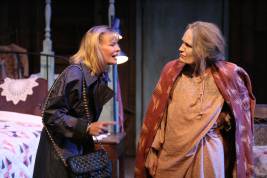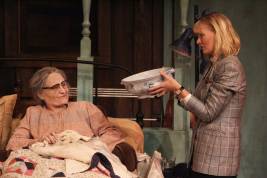
Take two very different individuals, put them in the same space over a period of days, weeks, or years, and watch how they change each other’s lives. This is a formula that has worked to perfection in the Colony Theatre’s critically acclaimed productions of Trying and Educating Rita. The same formula works its magic once again in Tom Ziegler’s Grace And Glorie, a gem of a “two hander” sure to be as much a critical and audience favorite as its predecessors, all three superbly helmed by director Cameron Watson.
With Beth Grant giving a performance likely to earn her the praise she garnered for her multi-award-winning turn in Trials And Tribulations Of A Trailer Trash Housewife, and Melinda Page Hamilton doing stellar work opposite Grant, Grace And Glorie opens the Colony’s 2010-2011 season with homespun charm, laughter, and tears.
Grace Stiles (Grant) is a 90-year-old Blue Ridge Mountain widow who’s buried a husband and all five of her children and is now getting ready to join them, her doctors giving her only a few more weeks on this earth. New Yorker Gloria Whitmore (Hamilton) is a hospice volunteer in her mid-thirties arrived at Grace’s log cottage to help her die, something which Grace feels entirely capable of doing on her own, thank you very much and goodbye.
Not surprisingly, since Grace And Glorie is a two-act play, the “city bred Yankee” decides to stick around, Grace clearly needing help that her one and only grandchild Roy seems too busy (or uncaring) to offer, and Grace quickly dubs her Glorie, the two women’s name reminding her of a hymn verse about “grace and glory.”
Glorie’s first order of business is to help Grace, still too weak to get out of bed, to pee, and what Glorie finds as a substitute bedpan is not only a hilarious stand-in, but a fitting comeuppance for Grace’s mother-in-law Gabriella Stiles, whose nearly two decades spent in her married son’s home was “a string of nineteen of the slowest years of my life,” Grace recalls.
Despite the nonagenarian’s “I don’t need you” protests, Glorie is back the following morning after battling her way through a yardful of chickens. This second visit means learning to deal with Grace’s wood-burning stove (which makes even boiling water a chore that Glorie seems ill-fit to master) and learning that boiling a farm-fresh egg means first washing off the bird doo.
As the morning passes, facts are revealed—that Grace has been pressured by an unscrupulous developer into selling off her land, that Glorie’s husband pretty much railroaded his wife into a move from Manhattan to the Virginia hills following a family tragedy, and that Grace does indeed have one beloved relative still alive, her “youngest older brother’s middle son’s first daughter’s third child by her second marriage,” i.e. her thirteen-year-old great niece Luanne, who sends Grace letters from Mobile, Alabama.
No more of Grace And Glorie’s plot will be revealed here, though anyone who’s seen any other “odd couple” comedy-drama can guess that the two women will discover aspects of each other that they never dreamed were there, that there will be laughs (and tears), and that both women (and the audience as well) will come out richer for the experience. In other words, to quote Wicked’s Elphaba and Galinda, each will discover that “because I knew you, I have been changed for good.”
It’s hard to imagine a better choice for the role of Grace than Grant, one of Hollywood’s busiest film and TV actresses and the original Sissy in Del Shores’ cult smash Sordid Lives. Authentically Southern and invariably brilliant in whatever role she plays, Grant disappears convincingly into the wrinkled, age-spotted skin of a character decades older than she. In a performance filled with a mixture of homespun warmth and homemade vinegar, Grant doesn’t lose a single one of Grace’s hundreds of laugh lines nor does she stint on the tears this loveably cantankerous soul can elicit from even the hardest heart.
In every two hander, it seems that one of the characters tends to overshadow the other, but Hamilton’s fine, three-dimensional work as Glorie insures that Grace And Glorie is no one-woman show. It’s fun to watch this self-possessed, highly educated and skilled businesswoman meeting her match in a hillbilly illiterate like Grace. It’s moving in equal measure when Glorie lets down her guard and opens her heart and soul to the older woman. There’s a glow to Gloria Whitmore that gets brighter and brighter thanks to Hamilton’s luminous work here.
Scenic designer Jeff McLaughlin never fails to impress with his set designs, whether ingenious and surprising (He Asked For It, A Skull In Connemara) or simply beautifully real, like the log cottage he’s created for his Colony debut, lovingly detailed by MacAndME’s properties design and set dressing and gorgeously lit by Luke Moyer. Cricket S. Myers sound design is one of her best and most complex, combining bluegrass country music with sound effects as miscellaneous as clucking chickens, bulldozers felling trees, and an explosion or two. Terri A. Lewis has designed fine costumes for two very different ladies. Lara E. Nail is production stage manager.
Considering the Colony’s history of terrific two-handers and Grant’s deserved reputation as a scene stealer, I expected great things from Grace And Glorie. Needless to say, my hopes were more than fulfilled. With full houses a near certainty, reserve your seats posthaste for this entertaining, thoroughly satisfying evening of professional L.A. theater at its best.
Colony Theatre, 555 North Third Street, Burbank.
www.colonytheatre.org
–Steven Stanley
June 12, 2010
Photos: Michael Lamont





 Since 2007, Steven Stanley's StageSceneLA.com has spotlighted the best in Southern California theater via reviews, interviews, and its annual StageSceneLA Scenies.
Since 2007, Steven Stanley's StageSceneLA.com has spotlighted the best in Southern California theater via reviews, interviews, and its annual StageSceneLA Scenies.







 COPYRIGHT 2025 STEVEN STANLEY :: DESIGN BY
COPYRIGHT 2025 STEVEN STANLEY :: DESIGN BY